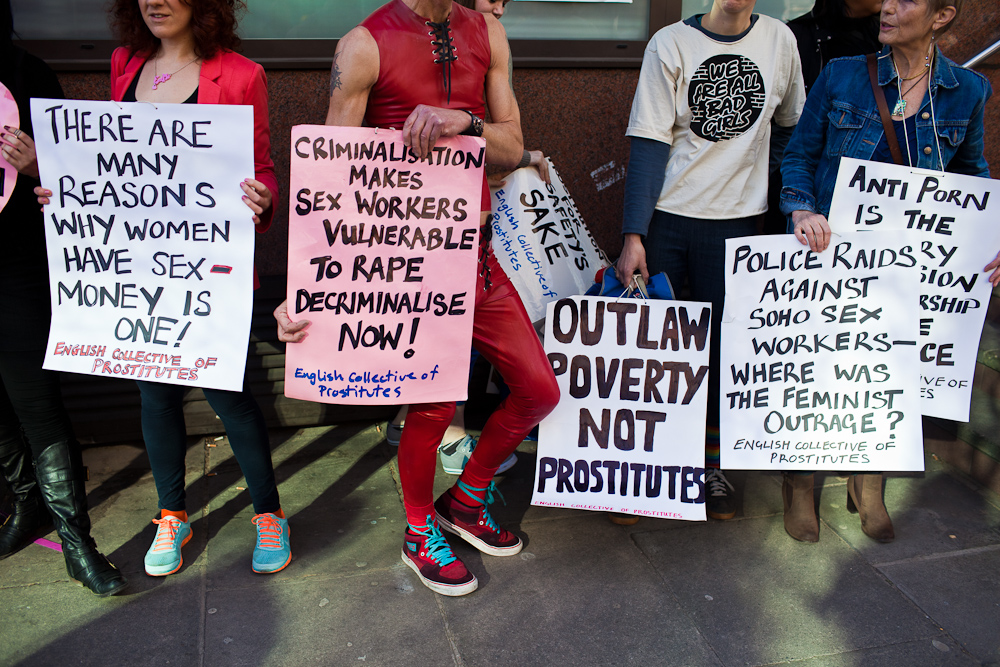The Pandemic Has Given Sex Workers a Grim Taste of Criminalisation
During lockdown street-based sex workers were shouted at, spat at and reported to the police for seeing clients.
by Vee H
14 April 2021

On Wednesday, the parliamentary Labour party met to discuss the Tories’ controversial new police bill. Instead of seeking to soften the new law – which would severely undermine protest and other civil rights – Hull MP Diana Johnson is trying to muster front-bench support for an amendment that would criminalise sex workers’ clients and the websites where they advertise.
Last week, Decrim Now published an open letter with signatories including Amnesty International, Sisters Uncut and musician FKA Twigs calling on MPs to stand against further criminalisation. A slew of recent articles have also explained why Johnson’s law would be dangerous for sex workers. Less has been said about the context. It is nothing short of cruel to make multiple attempts at Nordic model legislation (also known as the Swedish model or ‘sex buyer law’) when sex workers are struggling to survive during a pandemic. The threat of further criminalisation is also particularly devastating for sex workers who now have a heightened awareness of what is at stake, with sex working during lockdown providing a grim look into a potential future of working under the Nordic model: criminalised clients and a ruined earning capacity.
At the start of the year, Johnson submitted a sexual exploitation bill to parliament. If passed it would introduce into the UK Nordic model style legislation around sex work, which would criminalise paying for sex. Last month, Johnson also proposed amendments to the police bill, in an attempt to eradicate ‘kerb-crawling’, or paying for sex from street-based workers. On 13 April, the all-party parliamentary group on commercial sexual exploitation, chaired by Johnson, published its report calling for a reform of prostitution laws, including the criminalisation of buyers of sex and a ban on websites facilitating the sale of sex.
These constant legislative attacks against sex workers keep them in a state of continuous defence, preventing them from actually working to instead engage in unpaid advocacy and awareness-raising. With each and every proposed legislative amendment toward the Nordic model, sex workers feel obligated to respond outlining how the potential legal change will affect and endanger them. Now, during a time of precarious income and heightened economic precarity, sex workers are having to dedicate time and energy just to outline – again – how the Nordic model leads to clear documented harms.
The coronavirus pandemic really illuminates the horror that is the Swedish model and how violent and dangerous for sex workers an “end demand for sex work” approach is in reality. Thread 👇
— SWARM (@SexWorkHive) August 27, 2020
What’s more, this pandemic has, to quote the Sex Worker Advocacy and Resistance Movement (SWARM), “illuminated the horror that is the Swedish model” – this pandemic has shown us what sex working under heavy police control and heightened stigma looks like. Lockdown, when first announced, was vague and non-committal and the police enforced it at their discretion, often exceeding their statutory powers. For the first time, the general public experienced police overreach, something that sex workers have lived with for years as police enforce inconsistent prostitution laws in the UK and in other countries where sex work is partially or wholly criminalised.
Over policing did not just come from the police: ordinary citizens readily condemned those who stepped out in public, particularly when the government sought to shift the blame for its enormous failings on to individuals who did not follow the often unclear and inadequate lockdown rules. Sex workers, along with other minority groups, bore the brunt of this vigilantism. Over the last year, the English Collective of Prostitutes has received reports from across the country of brothels being raided and closed down and of street-based sex workers being shouted at, spat at and reported to the police for seeing clients. The criminalisation of clients reinforces social stigma against sex workers, which has always been one of the intended side effects of the Nordic model. Under the Nordic model, the message that sex work is violence against women and incompatible with equality, means that sex workers’ experiences of harm are weaponised against them.
At the beginning of lockdown, when the possibility of working and earning was sharply curtailed, SWARM set up a hardship fund to put money directly into the hands of sex workers. During the pandemic, it has been the peer-led advocacy and mutual aid groups that have stepped in to offer material support to keep women off the streets and less dependent on sex work. This has been necessary due to a lack of governmental assistance, including from MPs who wish to criminalise the industry. Though Nordic model supporters claim that it is pimps, traffickers and gangs forcing women onto the street the reality has always been much more banal: it is the need to pay rent and feed families. Instead of making sex workers’ lives harder with more legislation, the government should be helping them in direct and material ways.
We must learn from what we have seen during this pandemic and consider sex work as work, and sex workers as workers, deserving of the same labour rights as everyone else. This means they must be part of the legislative process. Additional criminalisation of sex work will further expose workers to violence, danger and precariaty. It is deeply depressing that a group of Labour MPs do not recognise this. But there is hope: the ever-growing list of supporters who signed the Decrim Now letter is a testament to the changing tide.
Vee H was a sex worker for ten years before retiring and beginning a PhD in social sciences. She advocates for sex worker rights with SWARM and The English Collective of Prostitutes. She will donate her fee for this article to the SWARM hardship fund.


